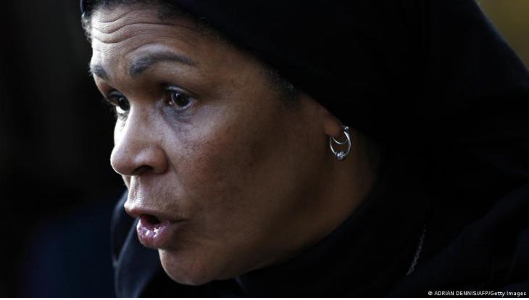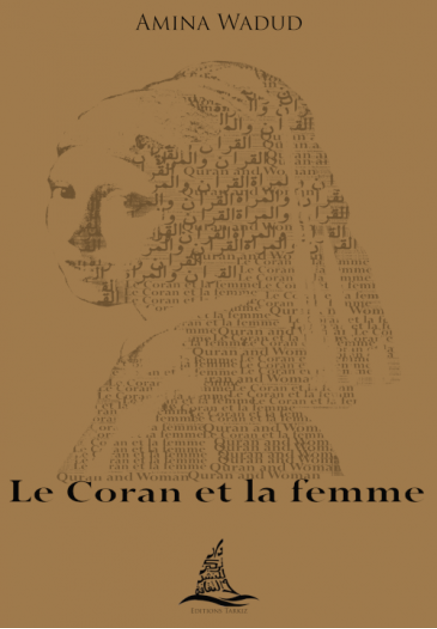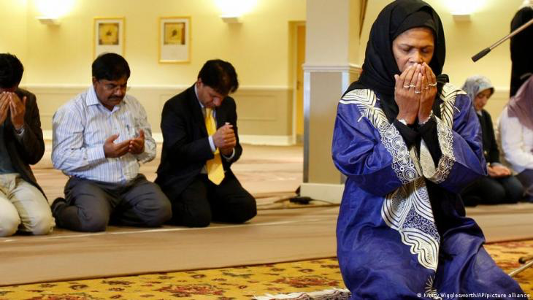
这是一个致力于介绍人类学观点、方法与行动的平台。 我们欢迎人类学学科相关的研究、翻译、书评、访谈、应机田野调查、多媒体创作等,期待共同思考、探讨我们的现实与当下。 Email: tyingknots2020@gmail.com 微信公众号:tying_knots
116 | Inequality between men and women, contrary to Islam
In 2005, a female Muslim scholar and imam led an outcry for worshipping men and women at a mosque in New York on Juma's Day. However, her contribution to gender equality did not stop at such a controversial event. In fact, Vaduud has repeatedly stated in interviews that he is a relatively "conservative" person. This scholar is the contemporary American Muslim theologian Amina Wadud (amina wadud, 1952-, in her name, she deliberately chose to lowercase the first letter, following the Arabic language convention).
In fact, Amina Wadud believes that in order to respect the universal values of the sacred texts of Islam, the Quran must also be interpreted from a female perspective, otherwise the scriptures will remain prisoners of patriarchal culture. A professor emeritus of Islamic studies at Virginia Commonwealth University, Vaduud is known for Islamic, gender, and Quran studies, especially feminist interpretations of Islamic classics, and is the author of The Quran and the Woman: Rereading Sacred Texts from a Woman's Perspective ( Qurʼan and woman rereading the sacred text from a woman's perspective, 1999 ) and Inside the gender Jihad: women's reform in Islam (2006 ).
Vaduud's book "The Qur'an and the Woman: Rereading the Holy Texts from the Perspective of a Woman" has been translated into French. We also take this opportunity to share what the French Muslim feminist sociologist Malika Hamidi has to say about Vadud, a glimpse of Vadud's groundbreaking contributions to Islam and feminism. We will also launch interviews and translations of Vadud himself in the future. Interested friends are welcome to continue to pay attention.
Of course, we must also see that the feminist interpretation represented by Wadud has caused a lot of controversy, even among Muslim female intellectuals, activists, and the general public. In addition, we cannot ignore the long-standing and diverse gender equality practices of Muslim women around the world. For example, Chinese Muslims have a long tradition of female mosques, or you can refer to the "History of Chinese Mosques of Women's Mosques" co-authored by Shuijingjun and Yasok. The original intention of sharing these voices is to reveal the diversity and complexity within the Islamic world, and to provide some inspiration for thinking about the multiple meanings of religion to people in the contemporary world.
Original author / Malika Hamidi
Original release time / July 7, 2021 Translator / Special proofreading by Wang Liqiu / Editing and proofreading by Ma Wenhui / Wang Jing
01. Inequality between men and women is contrary to Islam
In the 1980s, at the height of second-wave feminism on both sides of the Atlantic, "gender" became a tool in the scientific community to analyze gender inequality. It was during this period that Amina Wadud began her research in a field that had never been studied before - gender equality in Islam.
Vaduud uses modern interpretive methods, combined with the analytical tool "gender", to explore the relationship between men and women in the scriptures. She shows and affirms that there is indeed a principle of equality between men and women in the Qur'an.

In view of her theoretical thinking and practical activities, Wadud is generally regarded as a leading figure of Muslim feminism and a contemporary Muslim intellectual in the world. She is good at interpreting the Quran from the perspective of supporting feminism, and claims that she "both supports the faith" And support feminism."
From the Qur'an's message, Vaduud calls for full equality between the sexes, both in the family and in society. In this regard, she denounced patriarchy, which, in her view, was contrary to Islam.
02. Interpreting feminism within Islam
Vaduud uses a hermeneutic approach to interpret the Qur'an on the basis of female sensibility. Her approach has three basic principles: taking the reader as the main body; analyzing the classics from a historical perspective; and interpreting the classics through the prism of gender.
She points out that the principle of equality has disappeared or even been erased in centuries of commentary; she calls for contextualizing our understanding of revelation and placing us in our own time, the postmodern age . She interprets the Qur'an with equality above all else, criticizes traditional interpretations, and sparks active discussions in the world's Muslim community.
According to Vaduud, Islam is always evolving and must also participate in postmodernity. It is through ijtihad اجتهاد (originally translated as "effort", by extension "creation", see endnote 1) that Islam is revived.
The pro-feminist Islamic scholar spoke of "fundamental reforms" and called for a "dynamically conceived Sharia", noting that the original revelation was also embedded in a deeply patriarchal context.
For Vaduud, it is the universality of the Qur'an that makes this possible. She explained through "the hermeneutics of the Oneness of God" that inequality between men and women goes against the will of Islam.

Vaduud points out that many Quranic verses express the idea of gender equality. For example, while verse 4:3 allows a man to marry four women, it also explicitly states that the context of revelation is to be considered and requires that each wife be treated equally. Failing that, monogamy would be better.
In the same way, Vaduud challenges verse 4:34, which is said to allow a man to beat his wife. Vaduud analyzes the multiple meanings of the word "daraba" (ضرب), which is generally translated as "hit" (specifically or figuratively), which led him to translate it as "to leave" (Arabic It does have this meaning in it - proofreading).
Wadud's first book was a huge success in the Muslim women's community and in academia. Especially for those interested in women's rights issues, her efforts to reread religious texts from an egalitarian perspective have opened up opportunities.
03. The future of Islamic feminism?
In 2005, the female imam became famous for leading prayers in front of 100 men and women who gathered in Manhattan's Episcopal Church on Sunday, a move that raised a key question about female religious leaders in Islam: what can women do? Do you lead men and women in worship at the same time? The incident sparked outcry and criticism in various international Muslim communities, demonstrating the "conservative" nature of some religious leaders and religious scholars, who were reluctant to accept the demands of Muslim feminists.
The Islamic mass media not only disseminated, but amplified, the reaction of most scholars and activists in the world's Muslim countries: women cannot lead men and women in worship at the same time. It should be noted, however, that there is no consensus among these scholars and activists on how to interpret the Qur'anic verses and hadiths on this issue.

This move in March 2005 exposed the fear of change and, in fact, the fear of a split between "conservative" Muslims and "liberal" Muslims, further deepened by the presence of such a generation of Western Muslims. Fear: They refuse to fully embrace the traditional practices of their parents.
Vaduud declares that we can say "no" to interpretations that "fall into the trap of patriarchal scholasticism", but this position does not imply a negation of the text. "We believe that with the development of postmodernism and deconstruction, we can be guided by texts without being confined to literal expressions."
Like Amina Wadud, many Muslim women are beginning to realize that their holy book is the liberation of women. They seized the opportunity to use reason and mind, and the Qur'an's symbolic universe was so versatile that they were trying to understand it.
endnotes
[1] Creation is the free translation of the Arabic "Ijtihad", which originally means "effort", and is extended to "creation". Instruct the jurisprudence authority to deduce the whole teaching method based on the general spirit of the Quran and the Sunnah, using reason, through reasoning, comparison, judgment and other methods to deduce new situations, new things and special situations that appear under new historical conditions. The whole thought process of legal conclusions and regulations with the same purpose. Including the selection, interpretation, and application of the Quran, Hadith, until the formation of new precedents.
author
Malika Hamidi is a French Muslim feminist sociologist and a researcher at the French Institute of Social Sciences. She is the author of "Muslim Feminism in Europe" (Il femminismo musulmano in Europa, 2015) and "Muslim Feminism, Why not? (Un Féminisme musulman, et pourquoi pas?, 2017).
translator
Wang Liqiu, from Maitreya, Yunnan, holds a Ph.D. in Comparative Politics from the School of International Relations, Peking University, and is a lecturer in the School of Humanities and Social Sciences, Harbin Engineering University.
Arabic proofreading
Ma Wenhui, from Ningxia, is a graduate student in Arabic at Beijing Foreign Studies University.
original
Malika Hamidi, "Amina Wadud's 'Qur'an and Woman' Revisited: 'Inequality between men and women is contrary to Islam'", Qantara , 07. 07. 2021, https://en.qantara.de/content/amina- waduds-quran-and-woman-revisited-inequality-between-men-and-women-is-contrary-to-islam.
Posted in Global Movement , Compilation , Reading
Latest articles (continuously updated)
107. Book News: New Anthropology Books in English (May-June 2021)
108. Pharmacy Services: Diclofenac, not just a drug for humans
109. Why social distancing feels so weird
112. From educational ethnography to anthropology of adults | Corona College Entrance Seminar 3
113. Reading Football: A Guide to Watching the Game from Anthropology (Part 1)
114. Reading Football: A Guide to Watching the Game from Anthropology (Part 2)
115. Marginal Domestication - Caring for Crop Wild Relatives and Lineages
116. Inequality between men and women, contrary to Islam
Like my work?
Don't forget to support or like, so I know you are with me..
Comment…